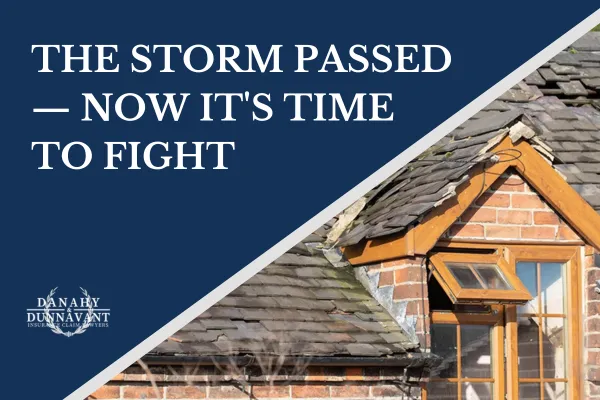
Roof Storm Damage? Florida Insurance Claim Lawyers Can Help
Florida homeowners are no strangers to severe weather. With frequent hurricanes and intense storms, roof damage from storm events is one of the most common and costly issues faced by property owners across the state. While your homeowner’s insurance policy is designed to cover roof storm damage, actually receiving a fair payout can be far more difficult than expected.
Insurance companies often delay, underpay, or even deny valid roof insurance claims, leaving homeowners to shoulder the burden of costly repairs. This is especially true after large-scale disasters like hurricane roof damage, when insurers are overwhelmed with claims and more likely to cut corners.
That’s where an experienced Florida insurance attorney can make all the difference. From reviewing your policy and gathering strong documentation to negotiating with your insurer or pursuing legal action for bad faith denials, an attorney works to protect your rights and maximize your compensation.
In this article, we’ll break down the common reasons why roof insurance claims are undervalued or denied and how Danahy & Dunnavant, P.A. can help you fight back after suffering roof storm damage.
Understanding Roof Damage from Storm in Florida
Florida’s weather patterns make it particularly vulnerable to storm-related roof damage. According to the National Oceanic and Atmospheric Administration ( NOAA ), Florida experiences more hurricanes and tropical storms than any other state, with many causing severe wind and hail damage to roofs.
Common Types of Roof Damage Include:
Wind Damage: Strong winds can rip off shingles, tiles, or even damage the roof’s underlying structure, leading to leaks and water intrusion.
Hail Impact: Hailstones can puncture roofing materials, weaken the roof’s integrity, and cause long-term damage.
Water Damage: Breaches in roofing allow water to seep into attics and walls, often leading to mold and structural problems.
The Florida Division of Emergency Management reports that roof damage remains a top cause of insurance claims after storms, often resulting in significant repair costs for homeowners.
What Your Insurance Policy Typically Covers for Roof Damage
Most Florida homeowners’ insurance policies include coverage for roof damage from storm events, but there are important details to understand to ensure your claim is successful.
Covered Perils Usually Include:
Wind damage roof issues caused by hurricanes or tropical storms
Hail damage to roof from severe weather events
Water damage resulting directly from roof damage (not from ground flooding)
Roof damage from hurricane winds or debris impact
Common Exclusions and Limitations:
Roof damage due to poor maintenance or general wear and tear
Flood damage, which typically requires a separate flood insurance policy
Pre-existing roof issues that existed before the storm event
In addition, many Florida policies include hurricane deductibles, which are often a percentage of your home’s insured value, these can be significantly higher than standard deductibles.
To avoid claim denials or underpayments, it’s essential to review your policy closely and understand exactly what your roof storm damage claim should cover. Knowing your rights and responsibilities can make a big difference when filing a wind damage roof insurance claim.
Why Roof Damage Claims Are Often Denied or Undervalued
Many Florida homeowners face denials or lowball settlements when filing roof damage claims. Here are some common reasons insurance companies dispute claims:
Cause of Damage Disputes: Insurers may argue the damage was due to pre-existing wear and tear rather than a covered storm event.
Insufficient Documentation: Without thorough photos, videos, and repair estimates, claims can be undervalued.
Adjuster Tactics: Some insurance adjusters minimize damage to reduce payout amounts.
Policy Language Confusion: Complex terms or riders (like hurricane deductibles) can lead to misunderstandings or reduced coverage.
Understanding these tactics is essential to avoid being shortchanged on your claim.
How a Florida Insurance Attorney Can Protect Your Roof Damage Claim
Hiring a Florida insurance attorney can be a game-changer in storm-related roof damage claims. Here’s how an attorney helps:
Policy Review and Interpretation: Attorneys thoroughly analyze your insurance contract to clarify coverage and exclusions.
Documentation and Evidence Gathering: Lawyers coordinate with roofing experts and contractors to document damage comprehensively.
Negotiation: Attorneys handle negotiations with insurance companies, fighting for a fair and full payout.
Bad Faith Claims: If your insurer is acting in bad faith delaying, denying without cause or undervaluing claims an attorney can file legal actions to enforce your rights.
Litigation Support: Should negotiations fail, your attorney can represent you in court to secure just compensation.
Many homeowners recover significantly more money with legal assistance than they would on their own.
Protect Your Roof Damage Claim Today!
Don’t let storm damage claims get denied or undervalued. If you’ve experienced roof damage after a storm in Florida, partnering with a knowledgeable Florida insurance attorney can make all the difference. Get the compensation you deserve, contact us now for a free consultation and safeguard your home and financial future!
Get a free consultation now to ensure you receive the maximum compensation you deserve and protect your home with confidence.
Frequently Asked Questions
1. How do I know if my roof has hail damage?
Hail damage may not always be visible from the ground. Common signs include dented or cracked shingles, missing granules, leaks, or damage to gutters and siding. A professional inspection can help assess the full extent of the damage.
2. Will my insurance cover a full roof replacement?
It depends on the policy and the extent of the damage. Some insurers may only cover repairs, while others may pay for a full replacement if the damage is severe. If your insurer undervalues your claim, we can advocate for the coverage you deserve.
3. Why do insurance companies often deny or undervalue roof damage claims?
Common reasons include disputes over the damage caused, insufficient documentation, pre-existing damage claims, and efforts to minimize payouts.
4. How can a Florida insurance attorney help with my roof damage claim?
An attorney reviews your policy, gathers expert evidence, negotiates with insurers, and can file bad faith lawsuits if the company wrongfully denies or delays your claim.
